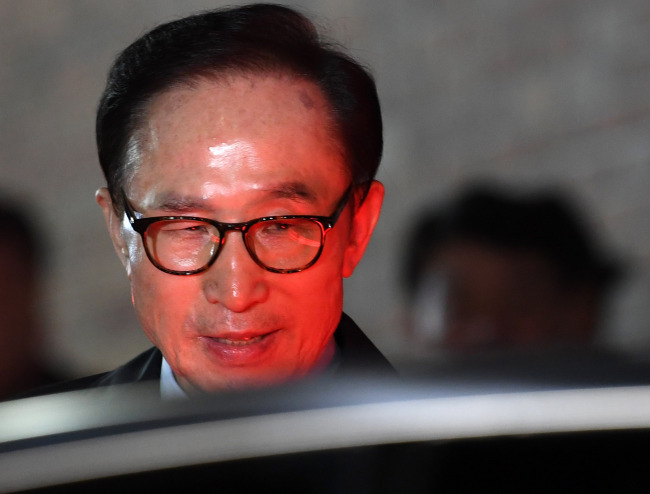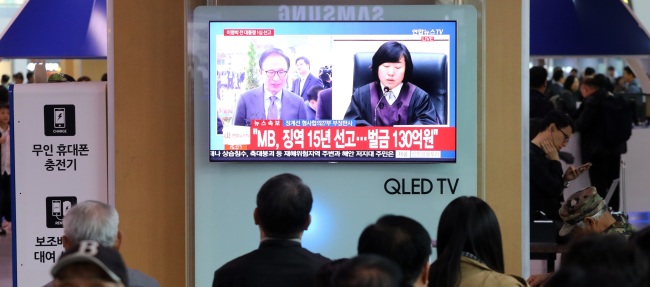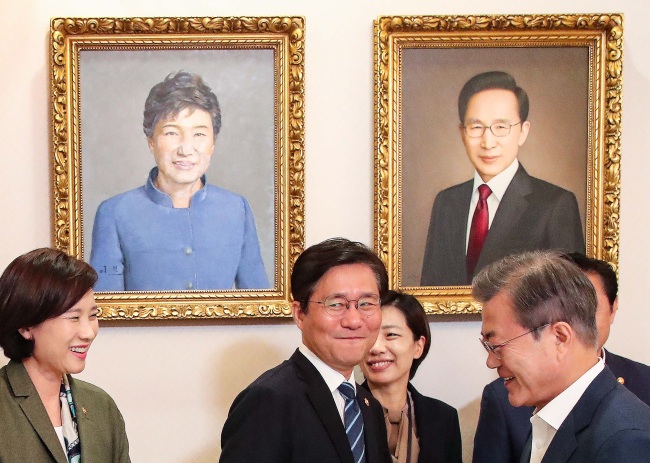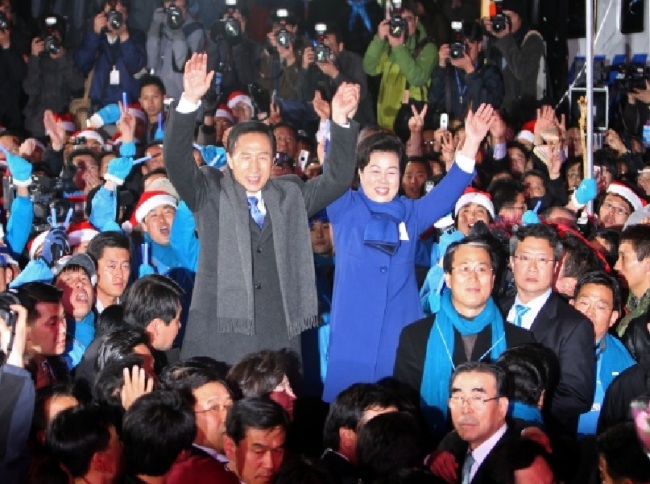Just a few days before he won the presidential election in December 2007, now ex-President Lee Myung-bak attended a church service in Seoul. “All of our family members became rich after believing in Jesus,” he famously told the worshippers.
If there is one thing that is clear about Lee, who was sentenced Friday to 15 years in prison for bribery and embezzlement, as well as a fine of 13 billion won, is this: He seems to have been obsessed with money.
Last week, the court ruled that Lee accepted $5.8 million in bribes from Samsung, South Korea‘s biggest conglomerate, during his presidency from 2008-2013. The court also found that he embezzled 24 billion won ($21 million) from DAS, an auto parts maker, of which he illicitly disguised his ownership under the name of his brother.

South Korean ex-President Lee Myung-bak. (Yonhap)
Lee’s net worth, reported in his first year as the President in 2008, was 35.4 billion won ($33.2 million) -- the largest amount ever reported by any South Korean President to this date. In other words, even before he took bribes and embezzled funds, Lee had already been a very rich man -- owning at least four properties in the wealthy southern Seoul district of Gangnam, as well as two golf clubs, among others.
“The word that best summarizes his life is money,” writes Joo Jin-woo, a local investigative reporter who has written extensively on Lee’s alleged illicit deeds, and has been subject to legal probes for his “controversial” reporting.
“Lee Myung-bak does not believe in people. He does not believe in love. He only believes in money. All of his thoughts and actions are motivated and driven by money.”
All of his crimes lead to one question: how and why did money become the ex-President’s virtual religion?
Poverty-stricken childhood Some experts say Lee -- who also served the head of Hyundai Construction and Seoul mayor before becoming the President -- may have formed such money obsession due to trauma of poverty.
Born in 1941 to impoverished parents, Lee was often forced to skip meals as a child. According to his autobiography published in 2015, the only food that was available to him during his high school years was grain residue from wheat alcohol distillation.
Whenever he had such residue for breakfast, his teacher could smell alcohol on his breath, and scolded him for drinking. But as Lee writes in his book, he did not explain why his breath smelled the way it did to his teacher -- it was too humiliating to reveal his poverty.

Seoul residents watch the sentencing of ex-President Lee Myung-bak on TV at Seoul station on Oct. 5. (Yonhap)
As a child, Lee once waited in line to get free second-hand clothing from the US from an American missionary. Lee, wearing tattered clothes patched at the knees and elbows, hoped to get a pair of pants that did not have any holes or rents. But before his turn came, all the clothes ran out and the young Lee became upset.
“I was ashamed even as a child (that I had to ask for free clothes),” Lee writes in his autobiography. “I never waited in line again whenever US missionaries gave out free goods to (Korean) children.”
Lee famously put himself through university by hauling heavy garbage every morning. According to his autobiography, he would always sit at the back of the classroom, anxious that he might smell like the trash he had collected.
“Making friends was unthinkable during my early days of university (because I was too tired from hauling garbage and too self-conscious of the garbage odor),” he writes in his autobiography.
An Hui-jean, a psychologist and professional counselor, observes that a repeated sense of shame dominates Lee’s account of his early years.
“A lot of the times, those who form obsessive behavior tend to do so in order to escape from what makes them feel ashamed,” An told The Korea Herald.
“Shame is actually a very powerful -- probably one of the most powerful -- emotions that leads one to feel as though his whole self is damaged, unacceptable or subject to exclusion. And it seems like Lee came to believe that money would protect him from feeling this way.
“He felt ashamed because he didn’t have money, and when he finally had money, he probably became terrified that he may lose it all again,” she continued.
“If he indeed felt the constant and unfulfilled need to illicitly gain wealth even after reaching the most powerful position in the country, it does seem like his behavior toward money has been obsessive.”
Money-rexia or unresolved maternal attachment Throughout his remarkable career -- from the head of Hyundai Construction to lawmaker to Seoul mayor to president -- Lee was infamous for being “too stingy” at times.
While staying in Washington in the late 1990s as a visiting scholar at George Washington University, Lee often played golf with Korean-Americans, according to reporter Joo’s book.
Quoting Erica Kim, a Korean-American lawyer who is the sister of a stock manipulator who allegedly collaborated with Lee, the book claimed that the ex-president would not pay the green fee while staying in the US, coming up with excuses such as not having any cash on him and thereby making someone else pay for him.

Ex-president Lee Myung-bak`s portrait (right in the back) is hung on the wall of Cheong Wa Dae. In the photo, current President Moon Jae-in (far right) is speaking to Education Minister Yoo Eun-hae (far left) on Oct. 8. (Yonhap)
Once, a Korean-American directly confronted Lee after a round of golf. “Mr. Lee, everyone needs to pay $300,” he told Lee, according to Joo’s book. “I don’t have any cash on me,” Lee replied. “Then do you have a credit card?” the Korean-American insisted. Lee’s reply was “I have a rather low credit limit on my card.”
The Korean-American did not give up and drove Lee to a bank so he could withdraw cash. After visiting the first bank, Lee said cash withdrawal was somehow “not available.” He had to drive Lee to three more banks in order to get that $300 from the man who later became Korea’s president.
Lee also had been notoriously closefisted to some of his closest aides. While serving as a lawmaker in the mid-1990s, he fired his driver of seven years after he asked Lee if he could borrow 2 million won ($1,900) as his landlord had abruptly raised the security deposit.
Lee’s pattern of behavior -- selective underspending combined with repeated embezzlement and the creation of slush funds -- mirrors the symptoms of money disorders, especially money-rexia and money worship, characterized by believing that one can never be wealthy enough and being convinced that more money will solve their problems.
However, psychologist An pointed out that not everyone who had an impoverished childhood ends up becoming like the ex-president. “Poverty can explain Lee’s behavior toward money, but one cannot say it is the sole cause of alleged financial criminal activities,” she said.
What could be, then, other causes of his arguably unusual behavior toward money? Choi Myung-ki, a psychiatrist at Cheongdam Harvard Psychology Center, believes money was a substitute for his principal attachment figure -- his mother.
The "transitional object”In developmental psychology, Choi explains, there is a term called “transitional object” referring to comforting objects -- such as blankets or stuffed animals -- that function as part of the emotional support system for a child when the mother is not around. And Choi believes that for Lee, that comforting object was money.
Choi, who has read Lee’s 2015 autobiography, points out that Lee’s mother was virtually absent as a primary caregiver when he was young. Although Lee writes very fondly of his mother, Choi says the autobiography also gives important factual details of his relationship with his primary attachment figure.
His mother was poor, strict and busy; she made Lee work as a child; she made her teenage son quit school to earn money full-time for his older brother’s tuition. When Lee was jailed for being involved in anti-government activism during college, his mother visited him at prison for less than a minute, although she was allowed three minutes.
Lee’s book barely mentions his father.
“Many children with parents who fail to meet their emotional needs tend to justify their mother or father’s behavior by blaming themselves.” Choi told The Korea Herald.
“For Lee, money was what kept his mother too busy. Money was also the reason why his mother made him quit school for his brother. He may have thought that because he could not earn enough money as a child, he did not deserve his mother’s affection and attention.
"And whenever he made money, the cash must have made him feel relatively secure and comforted. Not having that principal attachment figure can make any child highly distressed. It seems that throughout his life, he endured his mother’s absence by trying to get what his mother didn’t have -- money.”
Money over ethics
Lee won the 2007 presidential race despite allegations that he was involved in a stock-manipulation case, in which 5,200 investors lost some $60 million, as well as tax fraud and illicit real estate deals. As a former Hyundai executive he was best known for leading South Korea’s economic growth in the ‘60 and the ’70s. Lee was South Korea’s first president from the corporate world.
Many Koreans fell for his can-do image and pro-market platform. In the aftermath of the traumatic 1997-98 Asian financial crisis -- which created more irregular jobs as well as massive pay cuts and layoffs; In 1998, suicide rates among men rose 45% in South Korea -- Lee was branded as a potential hero who could somehow “rebuild” Korea’s economy. He pledged to attract foreign investment and boost the job market.

Ex-President Lee Myung-bak and his wife Kim Yoon-ok celebrate after winning the 2007 Presidential election. (Yonhap)
With 48.7 percent of the total votes, Lee won by the largest margin since 1987, with his liberal rival Chung Dong-young coming in with only 26.1 percent.
Chae Jin-won, a professor at Humanitas College of Kyung Hee University, said Koreans chose growth over ethics in the 2007 election.
“The biggest factor was the economy -- people wanted a game changer after the Asian financial crisis,” Chae told The Korea Herald.
“All of the allegations against him, including the stock manipulation, were out there -- they were made public especially during his party’s primaries. The mainstream media failed to report these allegations thoroughly with context, and people ended up voting for him regardless. As a result, we are still facing the consequences of choosing ’growth‘ -- this is an illusion after all -- over ethics.”
Almost five years have passed since Lee‘s term ended, and he is no longer perceived as a hero.
Politician Chung Doo-un, a close associate of Lee during his years as a Seoul mayor, recently defined him as a “slave of money.” Reporter Joo Jin-woo calls him a “god of money.” For many, he had been a criminal even before the court’s sentence was handed down last week. An online petition in 2017 requesting the presidential office ban Lee from leaving the country was signed by almost 106,000 people.
But aside from such adjectives, who is Lee Myung-bak at his core?
According to his book and psychologists, one possible answer emerges: A shame-stricken, impoverished and hungry child who was deprived of emotional support. And in the post-Asian financial crisis-era, many South Koreans voted for him, despite his questionable ethics, most probably because they wanted what that child wanted -- a sense of comfort and security.
By Claire Lee (
dyc@heraldcorp.com)








![[From the Scene] Monks, Buddhists hail return of remains of Buddhas](http://res.heraldm.com/phpwas/restmb_idxmake.php?idx=645&simg=/content/image/2024/04/19/20240419050617_0.jpg&u=20240419175937)
